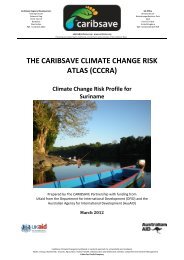Create successful ePaper yourself
Turn your PDF publications into a flip-book with our unique Google optimized e-Paper software.
4.4. Human Health<br />
4.4.1. Background<br />
The Intergovernmental Panel on Climate Change (IPCC) Fourth Assessment Report (AR4) defines health as<br />
including ‘physical, social <strong>and</strong> psychological wellbeing’ (Confalonieri, et al., 2007). An underst<strong>and</strong>ing of the<br />
impacts of climate change on human health is important because of its impact on the livelihoods of the<br />
people on a local scale <strong>and</strong> to the economy on a national level. In endemic countries, the environmental<br />
<strong>and</strong> social conditions make particular populations vulnerable to further disease outbreaks. Climate change<br />
has the potential to further impact the quality of the environment <strong>and</strong> the resilience of the ecosystems<br />
thereby increasing the risk of disease epidemics.<br />
Health is an important issue in the tourism industry because tourists are susceptible to acquiring diseases<br />
transmitted by insect vectors. In addition, air travel is responsible for a large number of diseases which are<br />
carried from tourist destinations to Europe (Gössling, 2005) <strong>and</strong> elsewhere in the world. This is highly<br />
relevant when one considers that approximately 75% of travellers become ill while abroad, most often<br />
from infectious diseases; morbidity is most often due to diarrhoea or respiratory infections (Sanford, 2004).<br />
It is also important because it can have consequences for tourist destination dem<strong>and</strong> which is a significant<br />
contributor to the Gross Domestic Product (GDP) of Small Isl<strong>and</strong> Developing States (SIDS).<br />
The potential effects of climate change on public health can be direct or indirect (Confalonieri, et al., 2007;<br />
Ebi, et al., 2006; Patz, et al., 2000). Direct effects include those associated with extreme weather events<br />
such as heat stress, changes in precipitation, sea-level rise <strong>and</strong> natural disasters or more frequent extreme<br />
weather events. While indirect effects are associated with changes in the environment <strong>and</strong> ecosystem as<br />
well as the impacts to various sectors such as water, agriculture <strong>and</strong> the economy on a whole (Confalonieri,<br />
et al., 2007). Both direct <strong>and</strong> indirect effects include the impact of climate change on the natural<br />
environment <strong>and</strong> can affect food security <strong>and</strong> agriculture sector, <strong>and</strong> increase the susceptibility of<br />
populations to respiratory diseases <strong>and</strong> food- <strong>and</strong> water-borne related diseases (Confalonieri, et al., 2007;<br />
Githeko <strong>and</strong> Woodward, 2003; Patz, et al., 2000; Taylor et al., 2009).<br />
The <strong>Turks</strong> <strong>and</strong> <strong>Caicos</strong> Isl<strong>and</strong>s has been classified as a “middle-upper income group country” (WHO-AIMS,<br />
2009). The quality of health care in the <strong>Turks</strong> <strong>and</strong> <strong>Caicos</strong> reflects that of a country with a fairly high<br />
st<strong>and</strong>ard of living <strong>and</strong> health care services as demonstrated in very low crude birth rates. See Table 4.4.1<br />
for statistics relevant to the health sector. Epidemiological statistics also indicate that the overall incidence<br />
of communicable diseases such as dengue <strong>and</strong> malaria is also very low on the isl<strong>and</strong>. There have been<br />
recent developments in the climate change sector with the preparation of the <strong>Turks</strong> <strong>and</strong> <strong>Caicos</strong> Isl<strong>and</strong>s<br />
Climate Change Green Paper that noted the potential impact of disease outbreaks on the tourism sector,<br />
that is, a decline in the number of visitors (Climate Change Committee, 2011b). The draft Climate Change<br />
Policy of the <strong>Turks</strong> <strong>and</strong> <strong>Caicos</strong> Isl<strong>and</strong>s was completed in September 2011. It focused on environmental<br />
education <strong>and</strong> awareness, the need for increased vector surveillance, increased preventative health care<br />
facilities <strong>and</strong> the strengthening of the health care system in areas related to p<strong>and</strong>emics <strong>and</strong> epidemics<br />
(Climate Change Committee, 2011a).<br />
60





